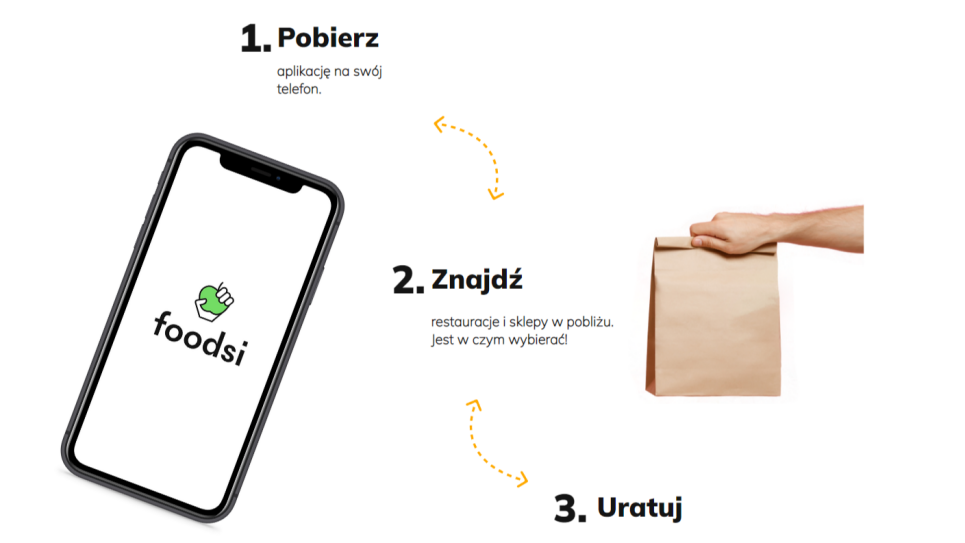HUBburger® Group Services
Log in
| admins |
| StreetTadeusza Tylewskiego 44 |
| 80-169Gdansk |
| Poland |
HUBburger® Group Services
Good because zero waste
Business
Author
| Filip Dzięciołowski |
| Filip Dzięciołowski |
| Street |
Date of publication 2023-02-14
Startup to reduce food waste, support eateries and surplus stores
Author
| Filip Dzięciołowski |
| Filip Dzięciołowski |
| Street |
Date of publication 2023-02-14

pic. press mats
In an era of rampant inflation, we are increasingly starting to take an economic approach towards meeting our most important needs. Also not to be overlooked is the ongoing energy crisis, which poses a growing problem for Poles and raises concerns about whether, after paying our heat bills, we will have enough money for the things we have been able to afford so far.
Let's be clear at the outset - everything is getting more expensive, and in the first place, food products, which a large percentage of Poles are increasingly forced to give up. Paradoxically, we can constantly see a bunch of discarded food in dumpsters that has gone bad in our refrigerators/pantries because we didn't have time to eat it.
Also, catering establishments or points where we can buy , "something to snack" are forced to throw away unsold products whose deadline set by the manufacturers has expired.
There are 8 billion people in the world, and more than 800 million people worldwide are affected by hunger. Adding to the bitterness of the whole situation is the fact that there is no shortage of food in the world at all; in fact, concerts produce a surplus of food, which is then thrown away in the garbage.
In Poland, the situation is not too cheerful either, due in large part to the ongoing armed conflict in Ukraine and the restriction of the supply chain of products needed for food production, causing prices to keep rising.
After this grim introduction and outlining the problem, we can now move on to more pleasant information. Well, there are people who were not indifferent to the problem of food waste and decided to stand up against it. Among such people we can count Matthew Kowalczyk and Jakub Fryszczyn, who established the Foodsi project in 2019.
The Polish startup's mission is to reduce food waste along with supporting caterers and stores with surplus goods left over.
Dozens of bakeries, pastry stores, cafes and grocery stores are already working with the project. And it's not just local businesses of small entrepreneurs, but also brands such as Salad Story, Pasibus, Thai Wok and Cofix.
How does it work in practice? Well, we create an account on their app, where we can choose what kind of food we are looking for - whether it's something to eat for lunch or baked goods, for example. What adds to the uniqueness of this ecosystem is the fact that there is a correlative phenomenon on both sides - we buy a given , "package" of food, for which we often pay a relatively low price in relation to the value of the , "product", and the seller on the other side has a so-called "product".. problem over, as he does not have to throw away unsold products, and he will still make a few zlotys on it.
The entity offering a given "package" with food issues something like an order, in which it states the price and possible time of collection, we can declare collection by clicking on the selected option and immediately make a symbolic payment. Thanks to this, we give food a , "second life" and can more than once eat well and tasty with the knowledge that and we saved (which, after all, is important in these times, as I mentioned at the beginning) and thanks to us food did not perish in the garbage. Can one? You can. And this is a fantastic solution that gives us the ability to solve several problems in one go.
Let's be clear at the outset - everything is getting more expensive, and in the first place, food products, which a large percentage of Poles are increasingly forced to give up. Paradoxically, we can constantly see a bunch of discarded food in dumpsters that has gone bad in our refrigerators/pantries because we didn't have time to eat it.
Also, catering establishments or points where we can buy , "something to snack" are forced to throw away unsold products whose deadline set by the manufacturers has expired.
There are 8 billion people in the world, and more than 800 million people worldwide are affected by hunger. Adding to the bitterness of the whole situation is the fact that there is no shortage of food in the world at all; in fact, concerts produce a surplus of food, which is then thrown away in the garbage.
In Poland, the situation is not too cheerful either, due in large part to the ongoing armed conflict in Ukraine and the restriction of the supply chain of products needed for food production, causing prices to keep rising.
After this grim introduction and outlining the problem, we can now move on to more pleasant information. Well, there are people who were not indifferent to the problem of food waste and decided to stand up against it. Among such people we can count Matthew Kowalczyk and Jakub Fryszczyn, who established the Foodsi project in 2019.
The Polish startup's mission is to reduce food waste along with supporting caterers and stores with surplus goods left over.
Dozens of bakeries, pastry stores, cafes and grocery stores are already working with the project. And it's not just local businesses of small entrepreneurs, but also brands such as Salad Story, Pasibus, Thai Wok and Cofix.
How does it work in practice? Well, we create an account on their app, where we can choose what kind of food we are looking for - whether it's something to eat for lunch or baked goods, for example. What adds to the uniqueness of this ecosystem is the fact that there is a correlative phenomenon on both sides - we buy a given , "package" of food, for which we often pay a relatively low price in relation to the value of the , "product", and the seller on the other side has a so-called "product".. problem over, as he does not have to throw away unsold products, and he will still make a few zlotys on it.
The entity offering a given "package" with food issues something like an order, in which it states the price and possible time of collection, we can declare collection by clicking on the selected option and immediately make a symbolic payment. Thanks to this, we give food a , "second life" and can more than once eat well and tasty with the knowledge that and we saved (which, after all, is important in these times, as I mentioned at the beginning) and thanks to us food did not perish in the garbage. Can one? You can. And this is a fantastic solution that gives us the ability to solve several problems in one go.
If you think this is an interesting article, it will be my pleasure if you share it with others.
Greetings
| Filip Dzięciołowski |
| Filip Dzięciołowski |
| Street |
- Share
tags
Tags
Recent
Health
Meditation and working with one's own mind is an ancient practice that has thousands of years of roots in many cultures and traditions.
Business
HUBburger.com CEO Maciej Sagal in an interview with The Birb Nest channel
The festival season can be seen around the corner, but at this event, in addition to the excitement of performances by Polish hip-hop stars - you will also be able to enjoy activities in a special hemp zone HUBburger.com
top3
Health
Author
| Justyna Moraczewska |
| Justyna Moraczewska |
| Street |
Date of publication 2023-02-10
Ecology
Author
| Monika Sobczak |
| Monika Sobczak |
| Street |
Date of publication 2023-02-10
Health
Author
| Monika Sobczak |
| Monika Sobczak |
| Street |
Date of publication 2023-02-15
Eco-friendly detergents, soaps and powders are a green alternative
Health
Author
| admins |
| Hanna Wolska |
| StreetTadeusza Tylewskiego 44 |
| 80-169Gdansk |
| Poland |
Date of publication 2023-01-10
New research leaves no doubt
Future
Author
| admins |
| Hanna Wolska |
| StreetTadeusza Tylewskiego 44 |
| 80-169Gdansk |
| Poland |
Date of publication 2023-01-09
Ecology
Author
| admins |
| Hanna Wolska |
| StreetTadeusza Tylewskiego 44 |
| 80-169Gdansk |
| Poland |
Date of publication 2023-01-09
Advertising
Recommended
Business
Web3/NFT project through which users receive casback in the form of tokens for purchases from subscribed vendors
Health
Protein powder is one of the most popular supplements used for weight loss and sports activities. Protein is essential for both building muscle mass and burning fat. Vegan proteins are becoming increasingly popular, among them proteins derived from hemp seeds. The easiest method of protein supplementation is a delicious and nutritious shake that you can quickly make and take with you wherever you want.
News
Oslo will have world's first all-electric public transport system. In the race for a better environment and population health, Norwegians are on the final straight.
News
Oslo will have world's first all-electric public transport system. In the race for a better environment and population health, Norwegians are on the final straight.
Podcast
We have selected for you the most interesting, in our opinion, episodes of podcasts on the subject of hemp, but not only. We also reserve space here for our audio production, which is slowly sprouting in our editorial office.


































Comments